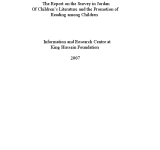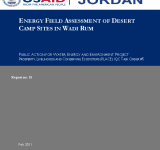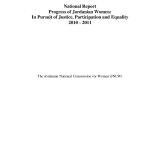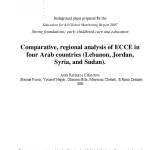والسياسات
The report is based on a field assessment of 16 desert campsites in the city of Aqaba – Wadi Rum and Dieseh districts to evaluate these camps’ energy needs and their current energy situation. As part of the Public Action for Water;; Energy and Environment Project (PAP);; a public education and behavior change communication program developed to support USAID’s technical and policy investments in the Jordanian water and energy sectors;; the report assesses the current government policies and behaviors related to the issues of water;; solid waste and energy at campsites in Wadi Rum and Dieseh. The fieldwork of the report was designed to assess current campsites’ situation and energy profile;; evaluate how to reduce their energy needs;; and assess the possibility of installing renewable energy for electricity. The report concludes with several recommendations such as the enhancement of energy efficiency;; re-design of the electrical lighting systems;; re-wire of the electrical circuits;; and enforcement of laws and regulations.
This national report is designed to trace the progress of women in various fields;; monitoring achievements;; and highlighting gaps and failures;; as well as analyzing indicators;; recommending measures;; and measuring levels of achievements in the implementation of plans and strategies. The main themes were selected according to national priorities dictated by each stage: Legal Protection for Women's Right to Access Justice;; Participation;; the Economic Empowerment of Jordanian Women;; Equality;; Citizenship and Decision-Making in Public Life. The conclusions of this report confirm that a much smaller effort was exerted at the level of providing information;; data and the provision of services in the area of providing justice and facilitating ways of achieving it. The lack of knowledge about available services among women;; whether provided by civil society organizations or government institutions;; affects women's ability to access justice negatively. Regarding the economic participation the Policies and plans that targeted empowering women economically show that the result of these policies was weak and limited. Difficulty of women’s access to job opportunities in the private sector and inequitable pay between the sexes;; lack of supporting services to working women;; including childcare Facilities;; poor matching between education outputs and skills required in the labor market and the traditional social standards that contribute to directing females towards certain professions. The report proposed general recommendations and directions that include quick solutions to deal with the main highlighted challenges.
This report provides an overview of the status of early childhood care and education (ECCE) in Jordan;; Lebanon;; Sudan;; and Syria. It examines the contextual factors influencing ECCE;; highlighting current policies;; challenges;; and strategies for improvement and expansion. The report underscores the paucity and limitations of available data. Findings show that ECCE services have improved but regional disparity and dominance of the private sector prevail. None of the four countries but Jordan has a full-fledged national strategy and policy on ECCE. Challenges identified include lack of qualified teachers;; societal misconceptions about the unique features of early childhood;; and lack of research-based studies. Innovative projects show that NGOs have been instrumental in addressing the needs of marginalized children.



